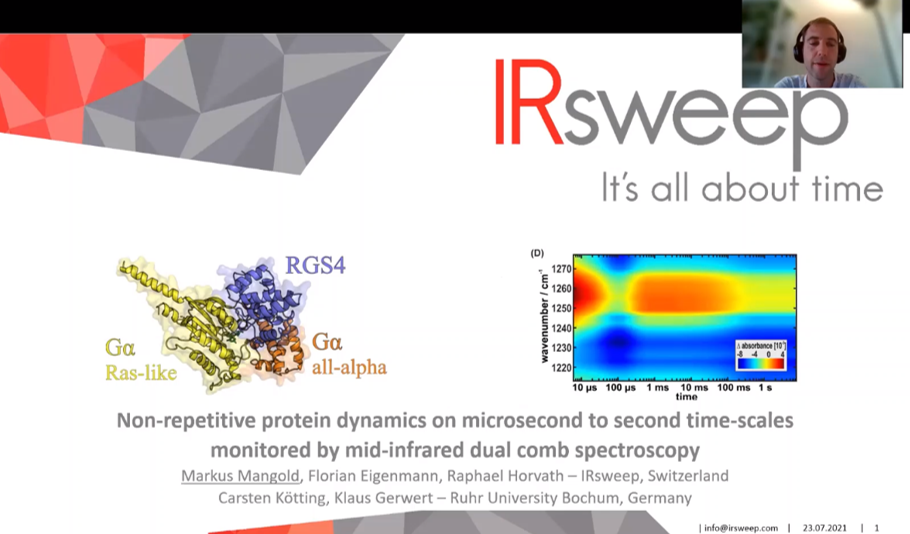Dual-comb spectroscopy has recently been introduced to protein dynamics as a tool that enables single-shot
measurements with microsecond time resolution. First results have been validated with the recording of transients
of the (well-repeatable) photoactivated proton pump bacteriorhodopsin with DCS and stepScan FTIR [1]. In this
presentation, we showcase how dual-comb spectroscopy (DCS) can be used to monitor irreversible protein dynamics
on a microsecond to second time-scale by applying DCS to the large field of G-proteins [2]. First, we compare the
hydrolysis of caged GTPs and their reaction with Gαi monitored by rapid-scan FTIR and DCS. We find a very good
agreement between the two techniques. Then, we measure the regulator of G-protein signaling (RGS) catalyzed
reaction of Gαi. At room temperature, this reaction elapses too fast for observation with rapid-scan FTIR. In the DCS
measurement, the reaction is well resolved and a time constant of 90 milliseconds can be assigned. Interestingly, we
further find indication of an intermediate state with a lifetime of only 86 microseconds. In conclusion, we observe
good data quality of infrared kinetics of G-proteins with 4 µs time resolution. This is three orders of magnitude faster
than any previously reported FTIR measurements of G-proteins. With this development, we pave the way for time-resolved infrared studies of non-repeatable protein reactions, including GTPases and ATPases.
[1] J. L. Klocke, M. Mangold, P. Allmendinger, A. Hugi, M. Geiser, P. Jouy, J. Faist, T. Kottke, Anal. Chem. 2018, 90, 17, 10494–10500. Single-Shot
Sub-microsecond Mid-infrared Spectroscopy on Protein Reactions with Quantum Cascade Laser Frequency Combs
[2] M. J. Norahan,
R. Horvath, N. Woitzik, P. Jouy, F. Eigenmann, K. Gerwert, C. Kötting ACS Anal. Chem. 2021, 93, 17, 6779–6783 Microsecond resolved infrared
spectroscopy on non-repetitive protein reactions by applying caged-compounds and quantum cascade laser frequency combs
Speaker

Markus Mangold
While co-founding IRsweep, Markus developed high-sensitivity trace gas sensors as a postdoc in the Air Pollution / Environmental Technology lab at EMPA. For one of these sensors, he was awarded the best innovation award at the European Photonics Innovation Village 2014. He received his PhD in Physics from TU Munich and his Master of Science in Nanotechnology from the University of Basel.

